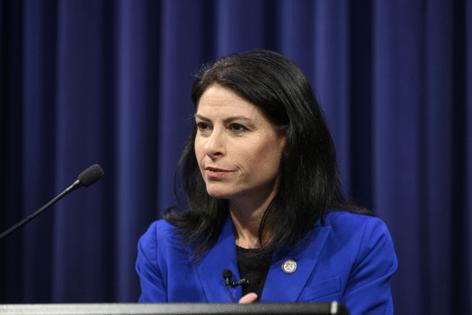Michigan settles with advocates, neighbors in civil rights dispute about hazardous waste
Published in News & Features
DETROIT — State regulators will consider environmental justice concerns when deciding whether to approve future licensing requests from hazardous waste facilities after the Michigan Department of Environment, Great Lakes and Energy settled a civil rights complaint about a controversial Detroit facility, the department announced Thursday.
Sierra Club, one of the groups that initiated the civil rights complaint, described the settlement as "groundbreaking."
"Our community has been fighting for a long time to get equal environmental justice in our eastside neighborhood," Pamela McWilliams, one of the residents who initiated the civil rights complaint, said in a press release. "We understand that there is a lot of work to do to make our community safe and healthy, but we put a dent in the problem. (I'm) looking toward a better future with even more improvement."
Sierra Club, Michigan Environmental Justice Coalition and neighbors to U.S. Ecology North filed the complaint in 2020 after the department renewed the facility's license and allowed it to increase its storage capacity. U.S. Ecology North is a hazardous waste treatment facility on Georgia Street in Detroit.
The groups, all represented by the Great Lakes Environmental Law Center, contended it was unjust to allow additional hazardous waste be stored in a neighborhood that is majority low-income and people of color.
The agreement signed roughly four years later creates more protections for residents living near hazardous waste facilities, Great Lakes Environmental Law Center Executive Director Nick Leonard said. The state will have to ensure facilities don't unfairly pollute low-income communities or communities of color, or don't add emissions in places that already are heavily polluted.
"For future licensing decisions, Michigan is going to have to do an environmental justice analysis, a cumulative impact analysis and basically make a determination as to whether the facility is going to have an unlawful impact on human health and the environment, and if they find it does, deny the license," Leonard said. "We're very excited to bring those concepts of environmental justice and cumulative impacts and make them a part of the licensing process."
He warned there may be future disputes that arise after the settlement because the parties didn't decide what would constitute an "unlawful impact" on human health or the environment.
"It's something that's left open, so I think it's something we're going to have to work to refine and figure out exactly what that means," he said. "By no means is the work done, but the framework is there. Now it's a matter of, how are we going to use it? Are we going to use it to advance environmental justice or is it going to be something that sits on the shelf?"
EGLE, the environmental advocacy groups and U.S. Ecology North neighbors reached the agreement through an informal resolution process, the department said Thursday. State officials praised the settlement in a press release.
"This agreement is the culmination of productive, good-faith discussions between EGLE staff and residents advocating for the health of their communities – a goal we share with them," EGLE Director Phil Roos said in a statement.
In addition to requiring environmental justice analyses, the parties also agreed that EGLE will provide robust translation and interpretation services to communities with limited English speaking proficiency, engage with communities to determine the best ways to get public input on hazardous waste licensing decisions and install three low-cost air monitors around U.S. Ecology North and make the data publicly available.
The state also will work with U.S. Ecology North neighbors to design and conduct a community health assessment around the facility, Leonard said.
"It is a good thing for our collaborative work to advance environmental justice that this settlement agreement has been reached," said Regina Strong, Michigan's environmental justice public advocate. "Addressing long-standing community concerns and protecting civil rights are critical."
Michigan Attorney General Dana Nessel also praised the agreement, which she described as "the result of extensive negotiations between the State and the community complainants to address environmental justice concerns in Detroit and Hamtramck."
"The agreement reflects state efforts to improve transparency and to find solutions to address community concerns within the confines of existing law," Nessel said.
_____
©2024 The Detroit News. Visit detroitnews.com. Distributed by Tribune Content Agency, LLC.







Comments